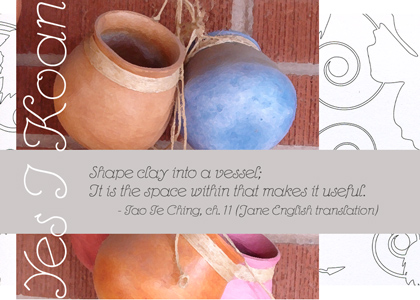
y e s i k o a n
A koan is a riddle in Zen Buddhism to demonstrate limitations of strict logic and prod a thinker
or reader to greater enlightenment by contemplating a paradox. I liked the idea of condensing these
realizations to a familiar form, though perhaps unexpected for Zen riddles - schoolbook analogies
(dark:light::hungry:full). As I was reading the collections of stories in
Zen Flesh, Zen Bones by Paul Reps, several of the stories stuck with me as good candidates for
analogy representation: in
A Parable, a man flees from a tiger by grabbing a vine and jumping over a
precipice only to be confronted with another tiger below him, also waiting to eat him. As he considers the
tiger above and the tiger below, he spots a strawberry growing on the vine - how sweet it tasted! The analogy
of
strawberry:tiger::life:death refers to the sweetness of the moment, of life in the face of our certain demise.
So pick the strawberry and enjoy it already! In
Muddy Road two monks are traveling and one helps a
young woman cross a river (contact with women considered unwise and dangerous). They continue
traveling until the other monk asks why he did it, to which the first says, "I left the girl there. Are you
still carrying her?". My first analogy was
woman:cargo::deviation:rule, the woman as cargo like a
deviation to a rule, which was all right, but then I considered the monk's answer and created
woman:river::burden:journey,
in which the woman across the river represented the virtual burdens one carries on throughout life.
The analogy
eight ounces:one cup::head:heart is the simple idea that the head and the heart are the same,
just measured in different units. We tend to pretend we live by one or the other, when the reality is
that we live through both.
•• d e s i g n s w i t h a n a l o g i e s
•• a n d o t h e r r e f l e c t i o n s
These pendants and jewelry items feature phrases that represent themes I've found important
throughout the years.
The phrase "
I would be a party girl if it weren't for my existential angst" is one that my
college roommate and I laughingly used to describe our conflicted approach to social engagements.
Society tends to reward loudness, and popular culture levies shame against being introverted.
Yet there is great value in quiet and self-reflection. What does it mean to be human? What does
it mean to live a good life, a thoughtful and deliberate life?
If you were a part of a sentence, which function would you adopt? I gain satisfaction by doing or
being, so a verb is the obvious choice. Jewelry items announce that the wearer identifies as a
"
verb," a "
person of action".
The Tao Te Ching is one of my favorite sources for reflection and meditation. I've encapsulated several
themes in simple statements like "
be like water" and "
hold fast to the center"
that represent ideas in the Tao to eschew extremes and embrace the wholeness of often contradictory
elements - "
yield and overcome" and "
bend and be straight." I would say that it is
a wise book, but the act of categorizing the text is itself part of the problem. It is a thoughtful
book that can focus the mind on fundamental quandries on what it means to be. Which of course feeds
the existential angst in social gatherings (see above). Yield and overcome!
What makes a dark div in stories, such as Sauron in
The Lord of the Rings or
Lord Vordemort in the Harry Potter series, is love of power above all things. Love of power
has long been associated with hubris and ultimately failure and death. The power of love, on the
other hand, is the source of life-affirming connections with others and the often the best
power within ourselves. True happiness cannot be taken by power or force, and thousands of years
of human history has shown that power without compassion or love undermines the best of humanity.
A straightforward choice: "
power of love not love of power."

